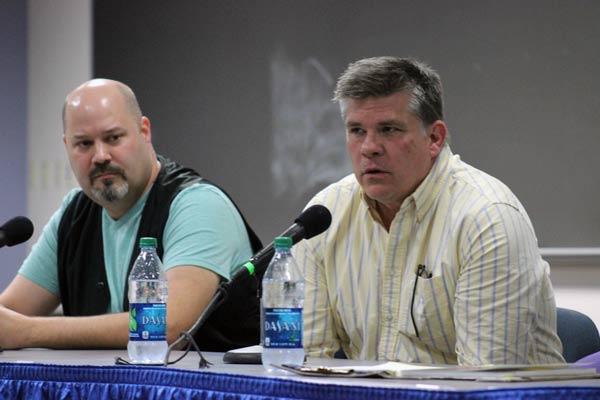Writer’s Life Lecture Series
Focus on writing for comic book industry draws large audience to opening event

Cory Carani looks on as Jeff Butler answers a question from journalism instructor Larry Hanson, who served as moderator.
October 4, 2014
The first installment of this semester’s Madison College Writer’s Life Lecture Series drew the biggest crowd in the three year history of the event, with an estimated 70 people in attendance on Sept. 25.
The opening event, “Writing for the Comic Book Industry,” featured three comic book insiders sharing stories of their lives in the business. KC Carlson, a blogger for Westfield Comics and former editor at DC Comics, Cory Carani, a former “inker” for the ‘Legionnaires’ series and video game artist at Raven Software, and illustrator Jeff Butler, who also teaches at Madison College and the Madison Media Institute, engaged in a panel discussion at the Downtown Campus.
While Madison College boasts dozens of courses aimed at teaching students how to craft a plot, character, news story, or poem, the goal of the Writers Life Lecture Series is to discuss what it means to be a writer.
“(Madison College) has a lot in terms of the how-to. This is an effort to give students interested in writing a look at what a career in writing might look like,” series coordinator and Madison College English instructor John Galligan said.
Galligan said that the growing interest in comics, graphic novels, and other visual narratives made comic books an ideal subject for the series.
“We’re trying to cover a lot of professional writing careers, and we’ve done a lot of the obvious ones (political writing, memoir, poetry, backpack journalism, etc.), but I think we really hit it with this one,” he said.
Madison College journalism instructor Larry Hansen moderated the discussion, and began by asking the panel to talk about what role comic books played in the lives of their 12-year-old selves.
Butler talked about how early in his life, his father, part of ‘The Greatest Generation’, saw comic books as trivial and childish, but came around after seeing the success his son attained in the medium.
“Dad didn’t get it. I remember him coming with me to a comic book convention and seeing people ask me for my autograph, and saying ‘I guess people actually read this crap’,” Butler recalled. “I think at that point he kind of got it.”
The discussion later touched on the panelist’s love of comic book storytelling. Carani explained that he saw comic books as an important vehicle for children beginning to read.
“I have seen tens of thousands of kids not super into literature, but they get a comic book in their hands and the next thing you know they’re reading,” he said. “It kind of draws them to the table.”
Carlson talked about how the gravity of the stories brought him in at an early age.
“I loved the larger-than-life aspect of comic books,” Carlson said. “There were certain aspects of my childhood that weren’t great, and comic books were a great escape for me.”
The hour-long event concluded with panelists answering questions from those in attendance.
The series is sponsored by the Madison College Journalism and Creative Writing Programs, and the School of Continuing Education.
The next installment in the Writer’s Life Lecture Series will be “Screenwriting for Film and Television” on Oct. 30. The event will feature Madison College arts and sciences instructor Bob Curry.
As with the rise in popularity with comic books and related media, Galligan said that the boom in high quality, long-form television has spurred an interest in screenwriting.
“Technology has really opened up filmmaking to people who are not owners of major studios. There’s a lot of people writing scripts now for their own projects,” Galligan said.






























